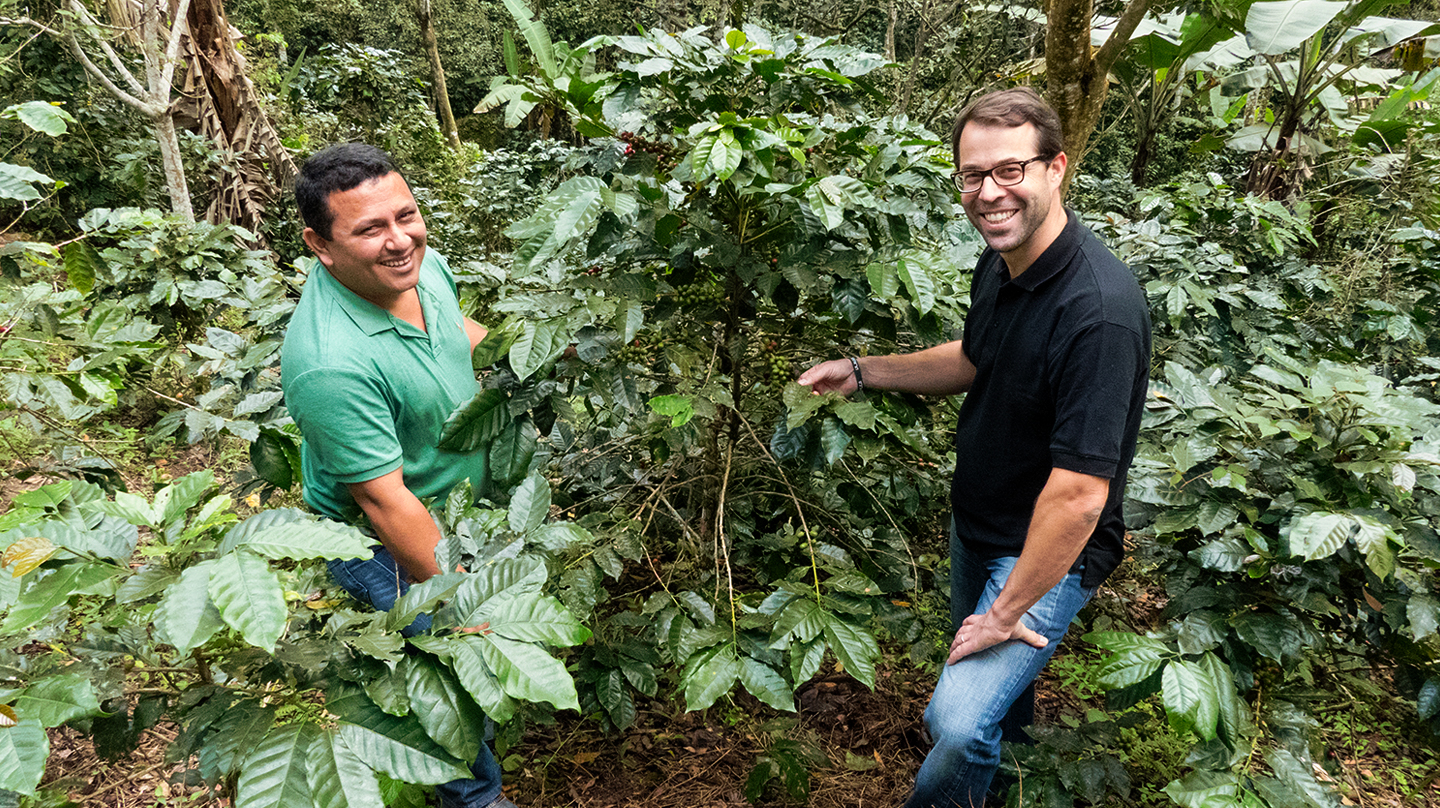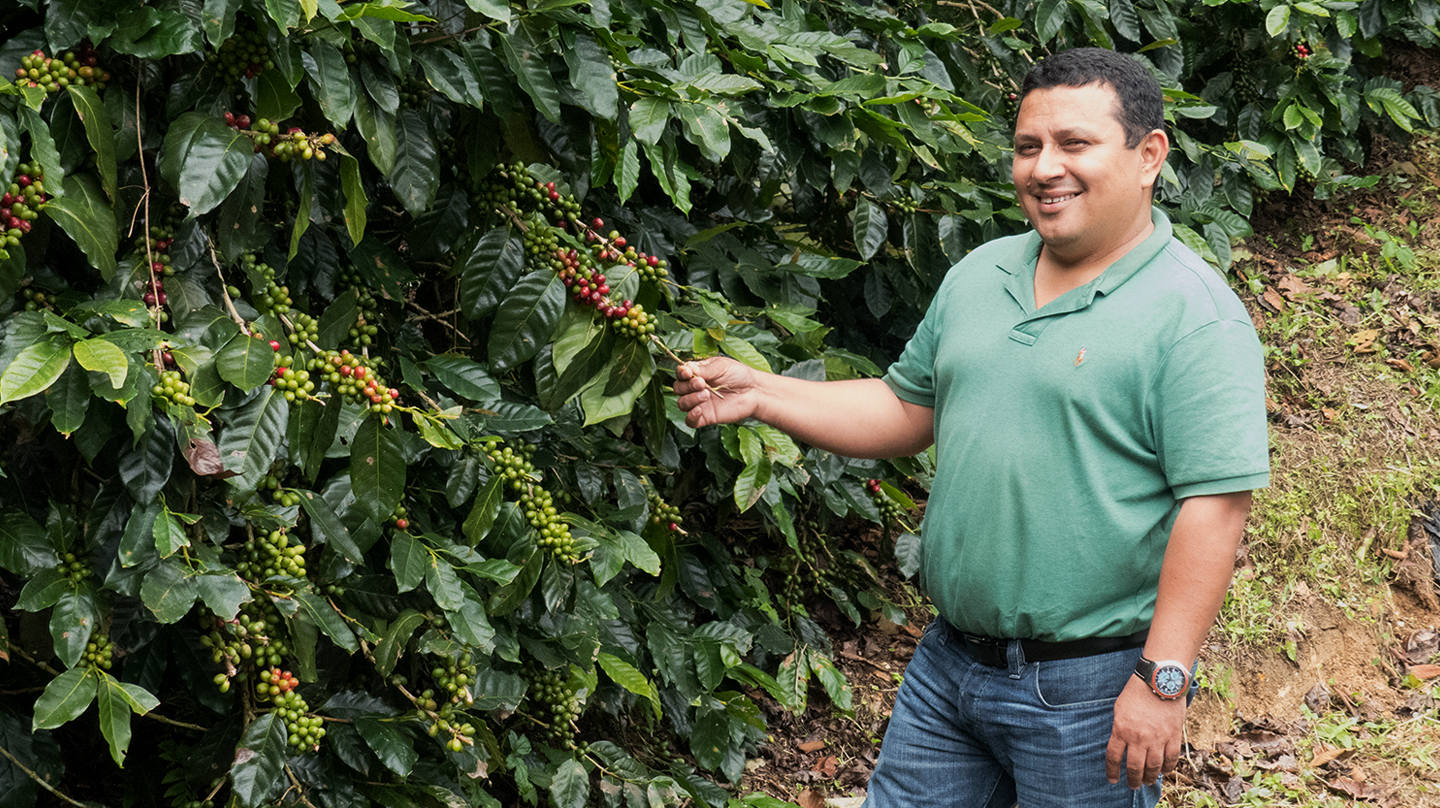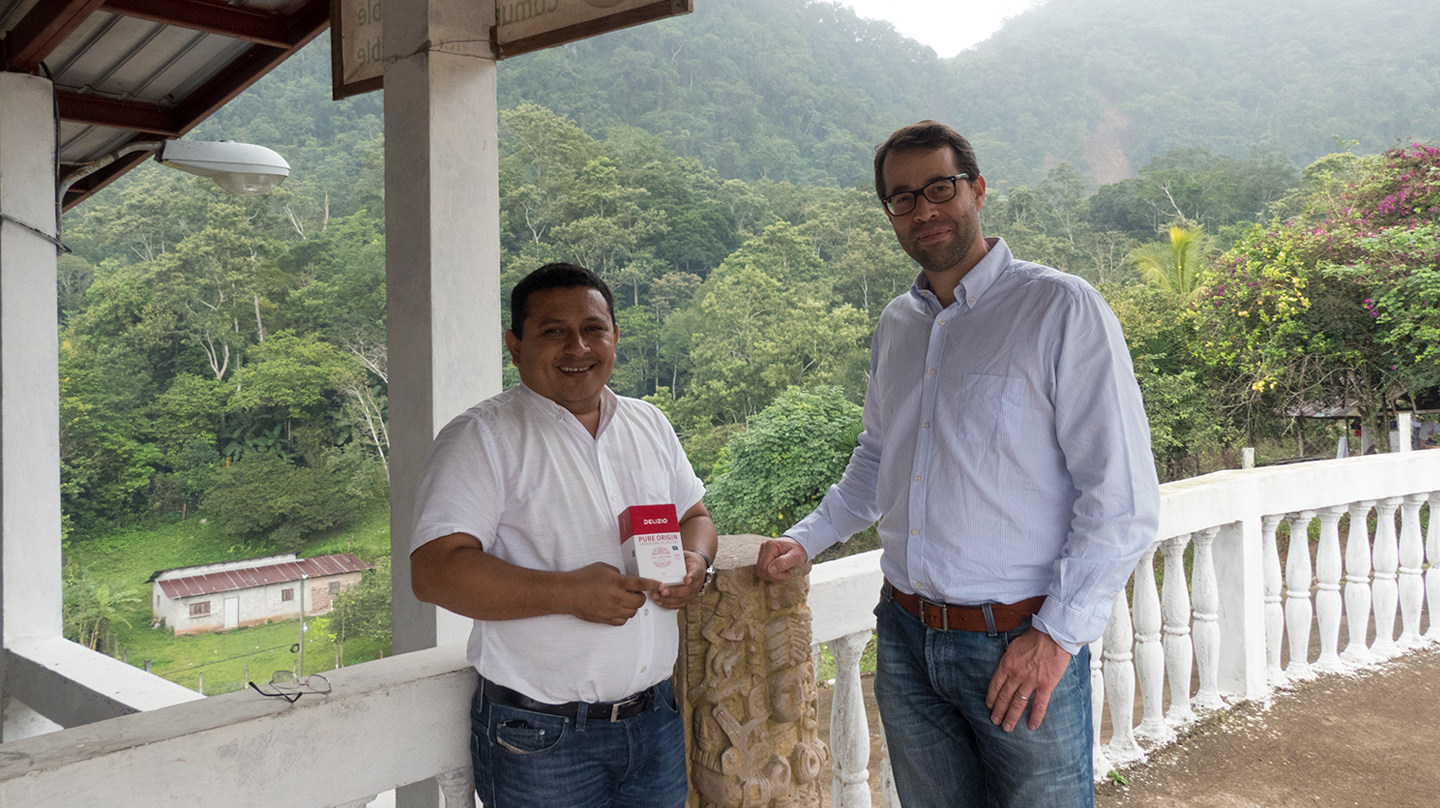Schon vieles hat sich auf La Laguna verändert, seit wir Anfang 2016 das Projekt der direkten Zusammenarbeit gestartet haben. Es gibt aber immer noch sehr viel zu tun. Unser Engagement ist langfristig und gibt allen Beteiligten Sicherheit. Dafür steht die neue Wandbemalung auf dem Beneficio: für das Commitment zwischen uns und Alfredo, dem Besitzer des Beneficios, in die Menschen von La Laguna und in ihren Kaffee zu investieren.
Raphael Gugerli, CEO der Delica AG, hat La Laguna im November 2017 besucht. Diese Gelegenheit haben wir genutzt, um ihn gemeinsam mit Alfredo zu befragen.
An interview with Raphael Gugerli, CEO of Delica AG, the producer of Cremesso
Why is Cremesso committed to this project?
Around one-fifth of our green coffee comes from Honduras. Positive development in this country is very important to us. With our project in La Laguna, we are supporting a small region, developing relationships with people on the ground and focusing our activities in those areas that need them most. Farmers are provided with sustainable support at all levels – with cultivation, processing, transport and ultimately also with the product. We do not simply send money over and then sit back and relax. Instead, we are actively involved in the implementation process. Ensuring a supply of green coffee over the long term is of course important to us. What is more important, however, is ensuring that it is supplied in a reliable manner and in a consistent quality. We achieve this through the involvement of the local farmers and the associated transparency within the supply chain. Thanks to the direct cooperation, we enhance the coffee expertise and trust of everybody involved. Our consumers should know where their coffee originates from and which people have been involved in its production.
What would happen if we were not here?
The farmers would not receive any training. They would have to take their coffee to be processed at another additional location. They would also have to find other purchasers for their coffee, such as intermediaries, who often exploit the good faith of the farmers during the purchase process and pay too little for the coffee. This all would have a negative impact on the income of the coffee growers and all those involved in this ecosystem, including the many pickers, for example.
Where do you see risks?
Following my visit to La Laguna, I now realise just how time-consuming and complicated it is to cultivate and transport coffee here and then have it processed at the “Beneficio”. Far more cumbersome than in other coffee-growing areas. The plantations are almost impossible to access in poor weather. This can already put an end to the desire to perform this demanding work. The dream of crossing illegally into the US and still earning more than at home with a poorly paid job is understandable. But even this option is only available to those who already have contacts in the US.
What is our mission here?
With our commitment, we are making a contribution towards ensuring the long-term existence of many people who are involved in the La Laguna coffee system. The direct link to the origin of the coffee cherries, which – after several intermediate stations – are transformed into a coffee product, is almost unique. The from-cherry-to-cup process is special for everybody involved, not only for the farmers and the employees of the “Beneficio”, but also for us as the roaster. Normally, no farmers or employees at a “Beneficio” know where their coffee is destined for. We must not underestimate what this means to the people here. After all, coffee is their life. We combine two worlds with Cremesso: the world where the coffee originates from, and the world where the coffee ends up – with the customers. We have the task of acting as an intermediary between these worlds. As an important link, we ensure that the conditions are good for everybody involved, that the relevant channels are transparent, and, of course, that the quality is also flawless. This generates a win-win-win situation: The coffee farmers receive long-term support and develop further, and we work together with motivated and reliable cooperation partners. The supply of coffee of outstanding quality is ensured, and the end consumers can enjoy this coffee. And we, of course, want to work together with the local experts to create new products and learn from one another.
What does Cremesso do specifically?
We are in close contact with the farmers, the processors at the “Beneficio” and the experts of La Laguna. We decide individually at what point which steps are required and go about them decisively. Projects are often overly ambitious and people want too much too soon. We, on the other hand, want to move forward at a pace at which the people and their plantations want to – and can – keep up with. Until now, we have made a difference at three levels: cultivation, processing and transport and sales. During cultivation, we work together with agronomists on site and offer support with model farms, farm management and also with UTZ certification. At the “Beneficio”, we have financed environmentally friendly and more efficient machinery that makes the process for removing the pulp from the coffee cherries and drying them much simpler. In the past, the farmers had to organise transport from the “Beneficio” to the next biggest city themselves. Thanks to this project, our export partner collects the already processed coffee directly from the “Beneficio”.
Why are projects such as this currently so relevant? And why are they set to be ever more important in future?
Products like coffee usually pass through one or more intermediaries. Among these, there are unfortunately also many who gain a benefit for themselves during the purchase process and pay the farmers too little for their goods. For us as a company that has always attached great importance to long-term cooperation and the traceability of our products, it is now high time that we go one step further: directly to the product’s origin, where we can take a look behind the scenes, get to know the people on the ground, and understand where their pleasure comes from and what real challenges they face. Sustainable change necessitates a long-term commitment. Certification is all well and good, but real cooperation goes beyond this. From an agronomic perspective, changes in the area of coffee cultivation require at least two years. Our direct cooperation with the local producers also create transparency. The cultivation, harvest, processing and transport processes are all monitored and documented. As one of Switzerland’s biggest roasting companies, we have a great responsibility within the coffee business. Both to our customers, who should only receive coffee of the highest quality, and to the people in the coffee’s country of origin, who deserve to be treated well and supported. The closer the cooperation is, the closer we are to the producers and the better we can ensure the quality of the coffee over the long term.
What is Cremesso planning for the future?
We will continue to work closely with La Laguna. The most important thing is to be on site two to three times per year and talk to the people there on a repeated basis about what their exact needs are and the specific difficulties they face. And, above all, it is important to build and strengthen trust. It is far from possible to achieve this with a one-time visit. We work in La Laguna at three levels, and are now also active at a fourth and fifth level with the product and the community. We also want to work in a targeted manner here to ensure that the overall situation continues to improve. Cultivation: In terms of cultivation, we have observed that many plants are in poor condition. This means that they bear too little fruit. For farmers and pickers, this means that the demanding work is hardly worthwhile, as the time-consuming process of picking the coffee cherries by hand is far more efficient and profitable if there is a lot of fruit on the tree. This will definitely be an area of focus for us. Some of the plants need to be replaced and cultivated with sufficient space between them, while others need to be pruned. Agronomists support the farmers and contribute to their expertise in connection with the correct way to plant seedlings, the pruning of plants and the use of fertilisers. Many farmers still think too much in the short term, plant the trees too close to one another and fail to prune them. This means they enjoy the benefits of only four to five good harvest years. The volume of fruit subsequently collapses, as the plants grow into one another and receive too little light. “Beneficio”: There is still potential for improvement as regards the technology and processes applied at the “Beneficio”. A great deal needs to be simplified. With the introduction of Internet access, it is now possible to collect all data from the connected farmers and to closely observe how, where and how much coffee is being grown and how high the farmers’ yields are. This allows for better planning and enables us to draw the right conclusions together with the farmers. We have already made significant progress in this respect. Some smaller farmers still also need to be convinced to provide their harvested fruit directly to the “Beneficio” for processing and not to undertake this step themselves. It is the quality of the coffee that suffers most of all as a result of unprofessional processing on a producer’s own farm, and this consequently has a negative impact on the flavour of the coffee. Everything hinges on the trust of the farmers, which needs to be developed and maintained. For farmers to be able to process their coffee in the “Beneficio”, they must be UTZ-certified. The related certification process is time-consuming, but we are able to offer valuable support on site together with the agronomists. The objective is to certify at least 300 farmers by 2021. Some 200 are already certified within the project. UTZ represents a first step, but we need to go much further with our project. Transport: A further difficulty is posed by the transport routes from the farmers to the “Beneficio”. Some have already been repaired, but many are still in great need of improvement – especially when it rains. Many smallholders do not have their own car, but the coffee cherries need to be transported for processing on the same day as they are picked; otherwise, they develop blemishes, and this in turn has a negative effect on quality. Together with the people on site, we need to develop a better, reliable transportation system that the farmers can afford. Product: We now have an outstanding coffee product in our range. So far, it has only been sold in Europe, but it should also be possible to purchase the coffee from La Laguna in Honduras. High-quality coffee often only finds its way abroad and locals are left with coffee of a lower quality. This should not be the case. In future, we are planning to offer vintage coffee from La Laguna. We are already experimenting with various processing techniques together with the local experts. We want to process the coffee here with local people in a more innovative manner than ever seen before. In other words, we want to create a world first. We cannot yet reveal too much here, but it is extremely exciting and we are already looking forward to it a great deal! Community: With our presence in La Laguna and our promise of a long-term partnership, we have already been able to gain a lot of trust. We have been able to simplify a great deal here with the Internet. A further objective is to establish farmers’ groups aimed at strengthening their position, therefore enabling them to speak with a single voice and better put forward their concerns. We would also like to strengthen the local community and its relationship to the coffee as a product.
How do you enjoy your coffee?
I like all of our coffee varieties, depending on the time of day and my needs. But this feeling of sitting here in La Laguna, drinking a cup of La Laguna coffee and looking over the densely vegetated green hills is really unique and simply indescribable.
What impressed you most in La Laguna?
For one thing, the lush green surroundings. This lushness is far more impressive when you experience it live rather than simply marvelling at it in pictures. But also all the efforts that lie behind the coffee cultivation process: remote locations and difficult terrain combined with unfavourable weather and transport conditions. What impresses me most, however, are these contrasts: Many people have a smartphone, but warm water is nowhere to be found. Most people have relatives in the US, but virtually nobody can speak English. And despite all of their struggles and the difficulties they face, the people are so positive and hospitable. Normally, visitors sleep at a hotel and complete perhaps a one-day excursion to the project site. However, we have stayed overnight with the locals and experienced the simple way of life here first-hand over several days. And I have also had the opportunity to drive for a while on these windy and steep gravel roads, allowing me to see up close just how challenging it is to transport the coffee cherries. It really was an experience!
An interview with Alfredo Rivera, owner of the “Beneficio”
What does this project mean for you and your “Beneficio”?
Everything! It is very important. You are the first company to come to the region and get something like this off the ground with us. In the past, the machines would sometimes stand still for days on end. The work at the “Beneficio” is now so much simpler, as we have defined processes in place and better processing machines. This makes the work easier for the people. For me personally, it is very satisfying to contribute to the development of something for the people and the region, and to see that we are making good progress.
What has changed for you, the employees at the “Beneficio” and the coffee farmers since the start of the project at the beginning of 2016?
Oh, a lot has happened. The entire infrastructure is better. Before, a great deal did not really work at the “Beneficio”. We now have improved transport routes – and we have these because the improvements at the “Beneficio” have given us so much encouragement for the future that we have intervened at government level due to the road conditions. The most important roads have now actually been improved. There is also something else: La Laguna is now a brand with its own logo that will become recognisable in more and more countries. Perhaps one day all around the world. This makes us really enthusiastic and very proud. The trust of the coffee producers has increased, and this is very important for the partnership as it ensures that they bring their coffee to the “Beneficio”. There also needs to be a belief that things will work. The customer, i.e. the roaster, now has a face! Normally, the coffee passes through so many unknown hands that we have no idea where our coffee ultimately ends up.
What do you wish for the future of the “Beneficio” and the people of La Laguna?
I hope that La Laguna coffee will also be available in the same packaging and with our new logo in Honduras, and that it will be purchased by local people.


